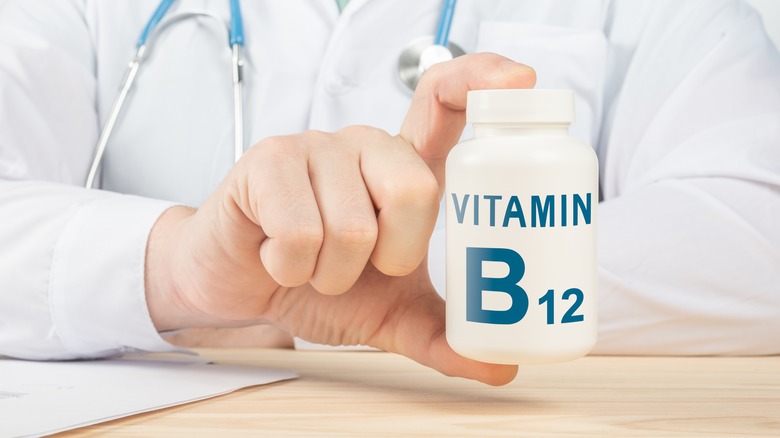This Is How Long It Takes For Vitamin B12 Supplements To Start Working
According to Cleveland Clinic, approximately 1.5% to 15% of people have a vitamin B12 deficiency. This deficiency occurs when a lack of vitamin B12 affects the body's ability to produce healthy red blood cells, per Johns Hopkins Medicine. It can lead to various symptoms, including mood changes, difficulty thinking, fatigue, pale skin, infertility, and dementia (via Medical News Today). Vitamin B12 deficiency can also affect your nervous system and lead to neurological symptoms like vision problems, paraesthesia, memory loss, and peripheral neuropathy, per the NHS. High-risk groups for B12 deficiency include adults aged 50 and above, pregnant women, vegans, and vegetarians (via Healthline).
Generally speaking, B vitamins are noted for their important role in maintaining health and well-being. Vitamin B12, in particular, plays numerous roles in keeping the body balanced. According to Harvard T.H. Chan School of Public Health, vitamin B12 helps grow red blood cells, develops brain cells, and binds the food proteins consumed into the body. The source also establishes vitamin B12 can be found in various sources, including supplements. As noted by the NHS, you may not get enough B12 vitamins from food alone; therefore, taking B12 supplements, also known as cyanocobalamin, can be a great way to manage deficiency.
How vitamin B12 supplements can help
Cyanocobalamin is the most commonly manufactured type of B12 supplement. If you've been prescribed these and are curious about how long they take to work, the NHS notes that it might take a few weeks before symptoms like tiredness begin to improve. However, this might vary based on age and severity of symptoms, so it's always best to speak to your doctor.
According to Drug Bank, cyanocobalamin has various brand names, including B-12, vitamin B12, and Eligen B12. There's a general mechanism for cyanocobalamin's effectiveness in the body, regardless of its numerous administration forms. A 2022 study published in the journal Stat Pearls notes that cyanocobalamin attaches to plasma proteins when they enter the bloodstream. The tissues absorb vitamin B12 binding proteins, transcobalamin I and II, and allow them to enter the cells. This leads to a total improvement of megaloblastic anemia and the gastrointestinal manifestations of vitamin B12 deficiency.
The source also establishes that there is also an improvement in neurological symptoms after cyanocobalamin administration. However, the rate of change often depends on the duration and severity of the patient's B12 deficiency.
How long does it take vitamin B12 to start working
The NHS notes cyanocobalamin comes in various forms, including capsules, tablets, drops, and mouth sprays. The administration might depend on the severity of your deficiency, so it's best to see your doctor for advice. According to Cleveland Clinic, people who can absorb B12 might benefit from the oral formulation. However, the vitamin B12 injection might be a better option for those who can't absorb the vitamin. With this option, the supplement is injected into a muscle or as directed by a medical professional (via WebMD). This is done once daily for the first week of treatment, per Medline Plus. The recovery time might depend on the severity of the deficiency, and improvement might take a few weeks. If you opted for injections, this might take just a few days, according to NHS.
Generally speaking, vitamin B12 supplements can be a great way to regain your energy levels if you suffer from B12 deficiency. But It's crucial to be patient with results and run every treatment option or product with a health expert, especially if you are pregnant or have any health condition.



